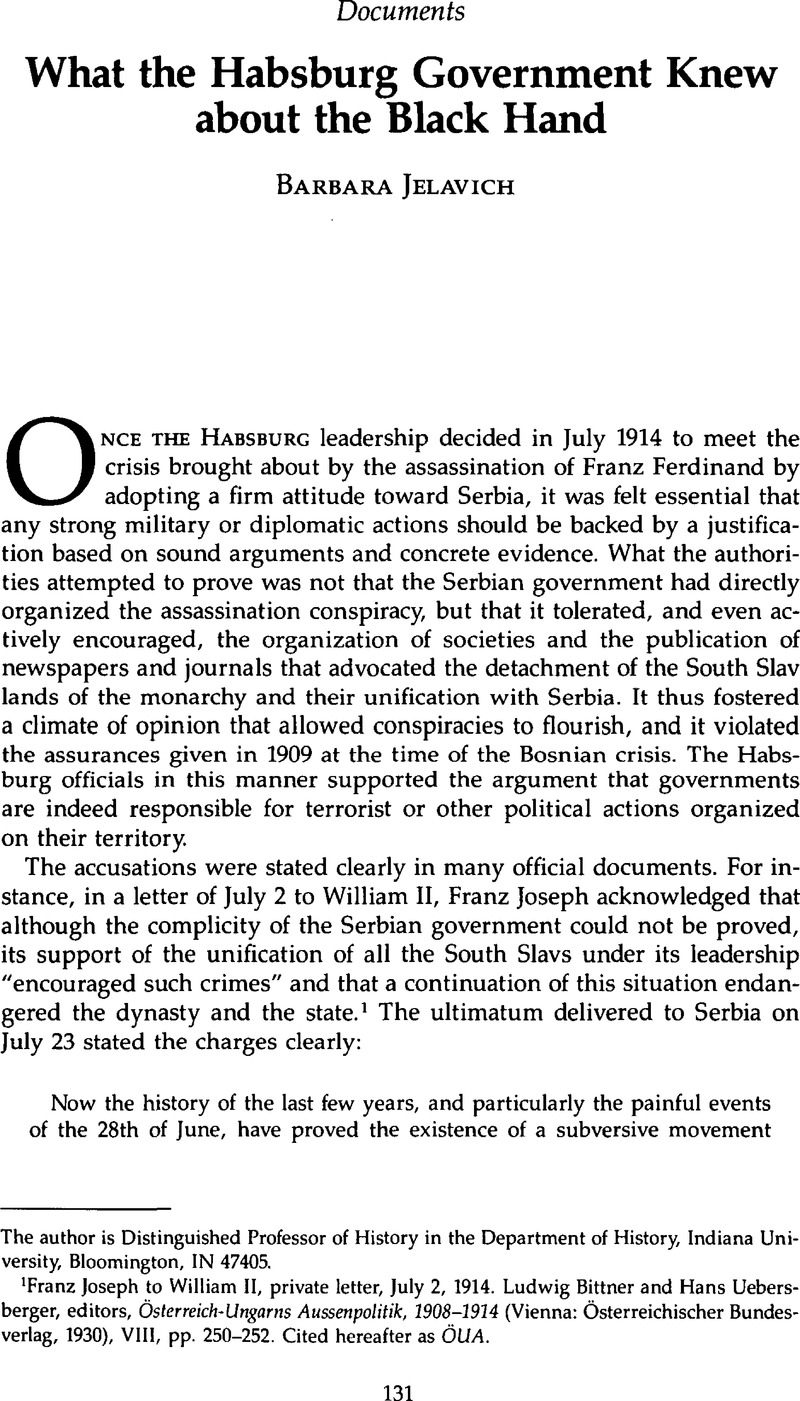Published online by Cambridge University Press: 10 February 2009

1 Franz Joseph to William II, private letter, July 2, 1914. Bittner, Ludwig and Uebersberger, Hans, editors, Öterreich-Ungarns Aussenpolitik, 1908–1914 (Vienna: Österreichischer Bundesverlag, 1930), VIII, pp. 250–252Google Scholar. cited hereafter as ÖUA.
2 Text of the ultimatum, ibid., pp. 515–518.
3 The text is printed in ibid. pp. 665–704.
4 Owings, W. A. Dolph, Pribic, Elizabeth, and Pribic, Nikola, The Sarajevo Trial (Chapel Hill: Documentary Publications, 1984) II, p. 416Google Scholar.
5 Ibid., p. 418.
6 Szápáry to Berchtold, tel. no. 146, St. Petersburg, July 18, 1914. ÖUA, VIII, 495.
7 Grey, Viscount of Fallodon, , Twenty-Five Years, 1892–1916 (New York: Frederick A. Stokes Company, 1925), pp. 300–301Google Scholar.
8 The events in Serbia at this time and the entire issue of the origins ofthe First World War are so controversial that it is impossible to present a summary on which all will agree. In fact, any conclusions on the events must remain tentative. Of the many books on the subjects discussed here see in particular Dedijer, Vladimir, The Road to Sarajevo (New York: Simon and Schuster, 1966)Google Scholar; Würthle, Friedrich, Die Spur führt nach Belgrad (Vienna: Fritz Molden, 1975)Google Scholar; and four articles: Bataković, Dušan, “Sukob vojnih i civilnih vlasti u Srbiji u prelecé 1914,” Istorijski čsopis, XXIX–XXX (1982–1983), pp. 477–492Google Scholar; Jelavich, Charles, “The Issue of Serbian Textbooks in the Origins of World War II,” Slavic Review, no. 2 (summer, 1989), pp. 214–233CrossRefGoogle Scholar; Vučković, Vojislav J., “Unutrašnje krise Srbje i prvi svetski rat,” lstorijski časopis, XIV–XV (1963–1865), pp. 173–229Google Scholar; and Williamson, Samuel R. Jr, “Vienna and July 1914: the Origins of the Great War Once More,” in Williamson, S. R. Jr, and Pastor, Peter, eds., Essays on World War I: Origins and Prisoners of War (New York: Social Science Monographs, Brooklyn College Press, 1983), p. 27Google Scholar. A recent biography of Dimitrijević is MacKenzie, David, Apis: the Congenial Conspirator (Boulder: East European Monographs, 1989)Google Scholar. See also Jelavich, Barbara, “Tsarist Russia and the Balkan Slavic Connection,” Canadian Review of Studies in Nationalism, XVI: l–2 (1989), pp. 209–226Google Scholar, and “When Diplomats Fail: Austrian and Russian Reporting from Belgrade, 1914,” Occasional Paper, no. 20, East European Program, the Wilson Center, Washington, D.C.
9 Dedijer, , Sarajevo, pp. 378–379Google Scholar.
10 For Pašić's activities see ibid. pp. 388–389.
11 Ibid., pp. 390–391. See also Albertini, Luigi, The Origins of the War of 1914 (London: Oxford University Press, 1953), II, pp. 96–98Google Scholar, and Zeman, Z. A. B., “The Balkans and the Coming of the War,” in Evans, R. J. W. and Strandman, Hartmut Pogge von, The Coming of the First World War (Oxford: Clarendon Press, 1988), pp. 28–29Google Scholar.
12 Memoir of Stefanović-Vilovsky, June 27, 1912. ÖUA, IV, pp. 232–238.
13 Ugron to Aehrenthal, no. 94A, very confidential, Belgrade, November 12, 1911. Ibid., III, p. 539; also no. 95 confidential, Belgrade, November 14, 1911, pp. 545–546.
For 1912 see Ugron to Aehrenthal, no. 7, confidential, Belgrade, January 25, 1912, III, pp. 790–792; no. 13C, confidential, Belgrade, February 6, 1912, III, pp. 812–814. See also no. 10B, Belgrade, January 29, 1912 and no. 14AB, Belgrade, February 9, 1912 in the Haus-, Hof-, und Staatsarchiv, Politisches Archiv XIX (Serbien), Carton 63. Cited hereafter as HHS. See Documentary Annex 1.
14 Gellinek report, no. 24, February 2, 1912. ÖUA, III, pp. 806–807.
15 Ibid., p. 806.
16 Secret memorandum on the condition of Serbia, June 25, 1912. HHS, PA XIX:63.
17 Giesl to Berchtold, no. 11B, confidential, Belgrade, January 20, 1914. ÖUA, VII, pp. 753–754. See also the military attaché report no. 12, Belgrade, January 18, 1914. Belgrad, Militä-Attaché, 1907–1914, KriegsarchivGoogle Scholar, Vienna. See the Documentary Annex, 2.
18 Confidential report from Belgrade, March 18, 1914. ÖUA, VII, p. 980.
19 Giesl to Berchtold, no. 67AB, confidential, May 8, 1914, ibid, VIII, pp. 19–20; no. 72 AB, confidential, Belgrade, May 16, 1914, ibid., VIII, pp. 41–42. Also military attaché report, no. 60, Belgrade, , 05 4, 1914, KriegsarchivGoogle Scholar. See Documentary Annex 3.
20 Military attaché report, no. 85, May 10, 1914, also report no. 90, May 21, 1914, Kriegsarchiv. See Documentary Annex 4.
21 Giesl to Berchtold, no. 72AB, confidential, June 16, 1914. ÖUA, VIII, pp. 41–42.
22 Giesl to Berchtold, no. 82AB, very confidential, Belgrade, June 6, 1914. ÖUA, VIII, pp. 118–120.
23 See Würthle, pp. 136–137, 231–234.
24 Wiesner's great difficulty in assembling material is described in DrWiesner, Friedrich Ritter von, “Die unwiderlegt gebliebene Begründung für das Ultimatum Österreichs an Serbien vom Juli 1914,” Berliner Monatshefte, V (1927), pp. 492–503Google Scholar.
* Some minor typographical errors, misspellings, and grammatical inconsistencies have been corrected to avoid ambiguities. The closing words in Document 1 have been omitted. In Document 5, the date in the parenthetical reference has been changed from “11./5.” to “10./5.” because the reference clearly is to Document 4. Sections marked in brackets were crossed out in the original and have been reinstated.
** Ugron refers here to the following document: Ugron to Aehrenthal, no. 7, Belgrade, January 25, 1912. ÖUA, III, pp. 790–792.